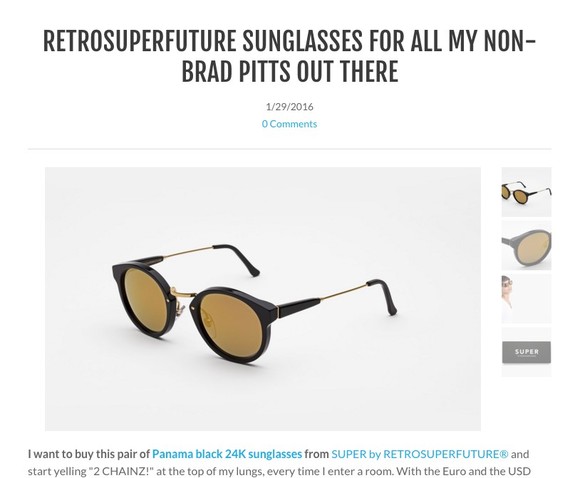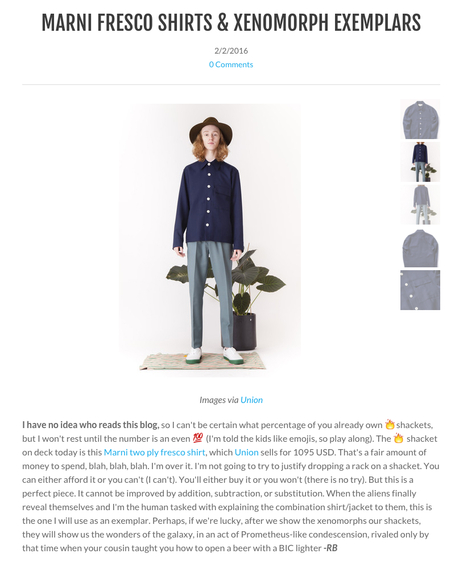A screenshot of a post on Rhys Bufford's blog, +Things That Are Good.
As I usually write about incredibly serious subject matter--war, international crisis and disaster--and the media projects that depict them, when given the chance to write about something lighter, I jumped at the chance.
Never mind, the recommendation came from a close friend, Tom Starker, a restauranteur and entrepreneur who had also been a charismatic, substantive figure in NYC club scene in the 80's and 90's, and featured in Andy Warhol's diaries. When he's impressed by someone, I tend to listen.
"Rhys is the son of a good friend of mine. And he's brilliant."
Rhys Bufford is brilliant. And multi-faceted.
Bufford, originally from the East Coast and a Yale graduate--now a transplant to Los Angeles--is mostly known for his blog, +Things That Are Good, which features fashion and lifestyle products, with both humor, and to my delight and amusement, what to some might be obscure philosophical, literary or historical references.
It elevates the "fashion blog" form to a kind of artful commentary that at the same time, doesn't take itself so seriously that the reader is repelled by the kind of hauteur typical of certain "poser" contingents whose solipsism runs obnoxiously rampant.
Bufford knows what he's talking about and can make it accessible, without dumbing anything down. That's one hell of an accomplishment for subject matter people with a different kind of hauteur might consider vapid.
Rather, Bufford recognizes that something done well can be an art form unto itself. Never mind, he has the intelligence and self-effacing, genuine charm that is wonderful to see from someone who is so multi-talented and faceted.
He also has a wickedly wry sense of humor.
First, could you give me a brief bio beyond what is on your site--you went to Yale, are from the East Coast, and now are in L.A.. You write music, screenplays, and have a fashion blog. Would you care to expand?
RB - I was raised in New Jersey. I like to lead with that because it lowers expectations. I went to school for a while, culminating in a heretofore largely unused Theater Studies degree, and now I'm a person that attempts to be a writer in Los Angeles. And I'm an awful autobiographer, but that's probably obvious.
Comparing New York (or the NYC area) with Los Angeles, and East Coast vs. West Coast (really, Los Angeles) can often be a cliché, but as a transplant, do you have any commentary regarding your reasons for moving to the Los Angeles area, and what it has provided in terms of inspiration vs. your east Coast experience?
RB - I went to college about seventy miles from where I grew up and stayed there for four years after graduation, so I had already worn out my East Coast welcome, when my wife and I were robbed and beaten during a gunpoint robbery, on our way home from our friends' apartment. I turned into an agoraphobe overnight. Everything terrified me. So I wrote a screenplay, trying to exorcise all the horrible thoughts and fears that were running around in my head, and I had one of those elusive Eureka! moments, where I realized that I wanted to write movies. A few months later, we moved to Los Angeles. I had never even been to California before and I didn't have a driver's license. Now I drive everywhere, complain about traffic, and wear a wool beanie whenever the temperature dips below eighty. I guess aside from the gun-to-the-head part, I'm living out the transplant cliché.
I noticed that between Yale, and you referencing The Atlantic on your blog--in addition to the nuance and intelligence of your writing--it's important to bring into your blog not just aspects of popular culture, but truly intelligent commentary about fashion, and what is trending. Have you had a response among readers of your blog about bringing in certain ideas, articles, or commentary that many in a lifestyle genre might not be familiar with or read as readily?
RB - I'm drawing on a limited data set here, but many of my frequent readers seem to come to my blog for a quick laugh, rather than fashion or lifestyle advice, which is probably for the best. Most people, myself included, aren't in the market for eleven-hundred dollar Visvim jackets, but everyone's on the hunt for distractions from the constant noise pumped in through our cable news networks and Facebook timelines. If I can provide that, I'm happy, because I'm far too lazy to ever write about anything other than the things I'm enjoying at that moment.
As your interests focus on more than one area (music, writing, fashion)--though all are creative at their base--what at the moment most inspires you?
RB - Right now I'm heavily into watching Cops. For a writer, it's a free lesson on crafting naturalistic dialogue. One of the characters in the screenplay I'm working on is a police officer, so I write it off as research. Not to oversell it or wax poetic, but that show is a window into our society and human nature. You learn things from watching Cops, like how bad the average person is at lying and how many of our countrymen are currently driving around shirtless, armed, and high on meth.
Do you have a personal philosophy that you live by, how did it come into being, and how has it influenced what you most choose to create, including the works closest to you?
RB - I wish I had something as solid as a personal philosophy. I've always just made whatever felt right at the time, whether it's fashion blogging or death metal. At this point, I'm focused on writing and not getting shot. So far, so good, but the close calls have been highly unpleasant.
Regarding fashion: what do you think are the strengths in the world of fashion right now, and what are its biggest weaknesses?
RB - The fashion world has well-documented problems with labor, but it seems like consumers are taking greater interest in the backstory behind the things they buy and that helps grow the market for ethically-made products. So that's a weakness in the process of becoming a strength. I think the harder-to-solve problem is textile production. Cotton is an extremely water-intensive crop and it accounts for something like half the fiber used for clothing worldwide. Since agriculture is one of the sectors most vulnerable to the effects of climate change, we're all but guaranteed to see a drop in cotton yields and a corresponding spike in prices. I'm neither an economist, nor a climatologist, but I have to assume that will mean problems for the world of fashion -- not unsolvable problems, although I would recommend cozying up to synthetic fabrics, if you haven't already.
Who in fashion most inspires you right now, and why? Are there old favorites among designers or brands that you always go back to, and why?
RB - If I had to choose one, my favorite brand would be this little label from Japan called orSlow. The clothes are painstakingly made and just great looking. Straightforward, but perfectly detailed. I listened to an interview with the designer behind the brand, Ichiro Nakatsu, and his approach is super simple: combining his personal style with classic materials and methods of construction. He loves basic pieces and denim, so he's a man after my own heart. To be fair, the interview was in French and I only understood about three-quarters of it, so maybe I missed something important. Either way, he seemed cool to me.
How has the media and information age (or what some are now calling the "technosphere") affected "lifestyle" branding--does it reflect, influence, or both? Are you noticing any specific trends?
RB - I don't think the information age has done much to fundamentally change lifestyle branding, but it has made it easier for brands of all sizes to find their demos. As a kid, I was a skateboarder and we received all that shared skate culture via dogeared magazines and bootleg VHS tapes. Even without the reach of social media, those brands were making money selling kids across the world on living a California lifestyle through skateboarding. Then the internet put subcultures on steroids and that can be a great thing for lifestyle brands looking to connect with low-percentage groups like skateboarders or denim aficionados or Bronies. Now we can go from metrosexuals to lumbersexuals to dandy wildmen so fast that I barely know what any of those things even mean. But I'm still putting money in the pockets of a beard balm manufacturer and that's all that matters.
Are there any social causes or issues you like to advocate? Have they ever affected what you choose to write about on the blog, or in what you feature?
RB - Even though I have an opinion on everything, I've tried to keep the blog as apolitical as possible -- which isn't that hard, considering that modern menswear and things like the war in Syria rarely dovetail -- but a couple of the issues that occasionally pop up are worker treatment and intellectual property rights, because there are a bunch of clothing companies with poor records in both arenas (overlap is not uncommon). Unfortunately, these are often companies that make affordable and widely available clothing, so they can be difficult to avoid. It's unrealistic to expect an overthrow of fast fashion in the near future, but we can all vote with our dollars and put a little pressure on bad actors in the industry to behave in a less dickish manner.
What is your view regarding the age-old dilemma in terms of what creative souls are almost always up against: passion vs. what is trending? Do you think they have to be mutually exclusive?
RB - I wrote up a poncho on the blog, a few weeks back, so I'm definitely not above a trend or two. I'd like to think that the operative distinction is between trends and fads -- fads being short-lived and baseless by definition. I'm not sure it's entirely impossible to rise above trends, as trying to rise above trends is a trend in itself. In my defense, I do write horror movies and those haven't really been on trend since the mid-to-late 80s.
Last but not least (a kind of Proust questionnaire-type question)...what is your favorite quote, and by whom? Why is it your favorite?
RB - I'm not good at recalling quotes, but I've been watching stand-up since I was a little kid, so I've always had a fondness for jokes. The late Mitch Hedberg was a genius and it's difficult to pick out his best one-liner, although "I'm against picketing, but I don't know how to show it" has to be one of my favorites. As anyone still reading this is sure to agree, I'm frustratingly long-winded and I greatly appreciate Hedberg's economy of words. I'm realizing that nothing's worse than explanations of humor, so I probably should have gone with something else, like one of Twain's pithy aphorisms, but it's too late for that now. And for the record, I'm not anti-picketing, just pro-jokes.

